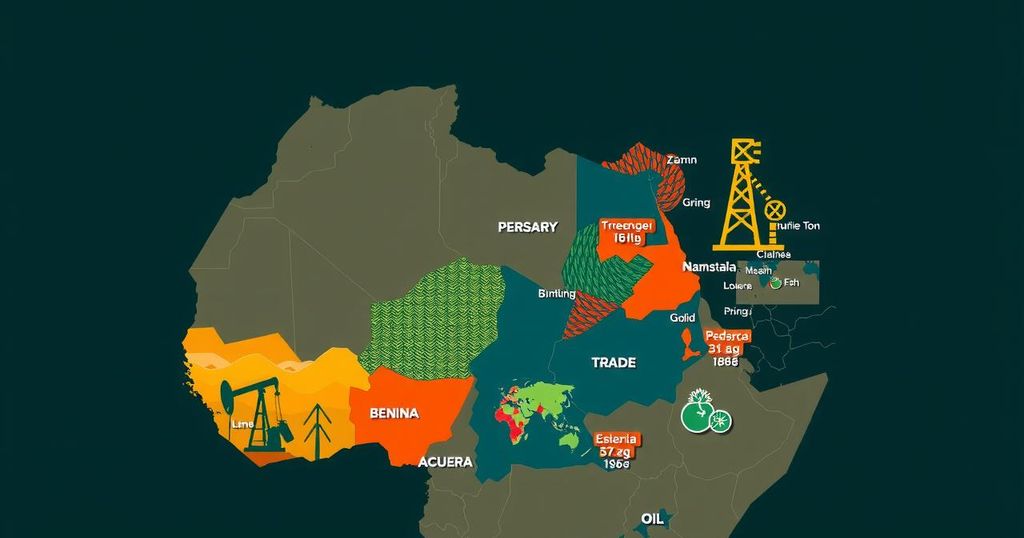Overview of the Economy of Benin: Challenges and Opportunities
Benin’s economy is largely dependent on external support, primarily from France. Following a socialist shift in the 1970s, economic liberalization and privatization began in the early 1990s. Agriculture employs 70% of the workforce, while industrial production is on the rise. The Cotonou port is vital for trade, with agriculture being the main export sector. Corruption and informal trade remain challenges.
The economy of Benin has long been characterized by significant dependency on external support, particularly from France and international organizations, which has minimally alleviated widespread economic stagnation. Following a coup in 1972, the government aimed to transition towards a more socialist framework, nationalizing vital sectors of the economy and fostering relations with socialist nations. However, persistent corruption and economic difficulties ensued, prompting a shift towards liberalization and privatization in the early 1990s.
Agriculture remains a cornerstone of Benin’s economy, employing approximately 70 percent of the workforce, with staples such as yams, cassava, corn, and rice cultivated alongside cash crops like cotton and coffee. Fishery resources are abundant, with substantial catches from both inland and coastal waters, primarily for export to neighboring countries. Benin also boasts mineral resources, including iron ore and limestone, alongside offshore oil discoveries that have been pivotal since 1982.
In terms of industrial output, Benin has developed several manufacturing sectors, including palm oil processing and cement production. Electrically generated power primarily depends on thermal plants, supplemented by hydroelectric power from joint projects with Togo. The financial sector underwent privatization in the 1990s, leading to the establishment of private banks and increased foreign investments, particularly from the European Union and the United States.
Benin’s trade landscape is primarily driven by agricultural exports, with cotton and palm oil as significant contributors. However, a reliance on informal trade with Nigeria has adversely affected the nation’s trade balance. The deepwater port at Cotonou serves as a vital trade asset, providing access for landlocked neighbors, enhancing the potential for customs revenue. Transportation infrastructure includes paved roads, rail connectivity, and a navigational system via coastal lagoons and rivers, facilitating trade and movement.
Overall, while Benin faces challenges related to dependency on external funding and corruption, its agricultural output and potential for industrial and trade development remain key drivers of the economy.
Benin’s economy has been shaped by historical reliance on external support, particularly from France, since its independence. The shift towards socialism following the 1972 coup aimed at nationalizing key sectors but ultimately encountered persistent issues like corruption and inefficiency. The agricultural sector forms the backbone of the economy, while industrial growth began to take shape through liberalization and privatization efforts in the late 20th century. The country possesses rich natural resources, which, coupled with agricultural exports, play a crucial role in its economic strategy.
In conclusion, Benin’s economy is characterized by its dependency on external aid, a primarily agricultural workforce, and emerging industrial sectors. The transition from socialist policies to a more privatized economy highlights the nation’s efforts to stimulate growth despite challenges such as corruption and informal trade. Efficiently harnessing its resources and trade potential, particularly through the Cotonou port, remains essential for Benin’s economic development.
Original Source: www.britannica.com




Post Comment